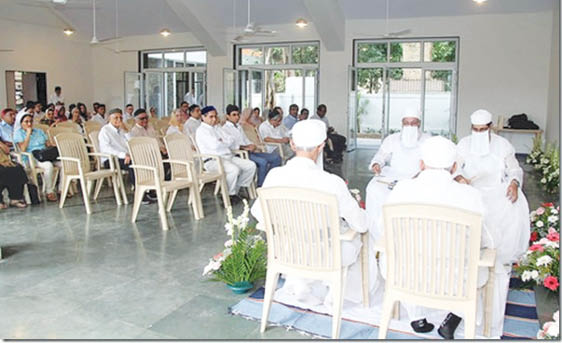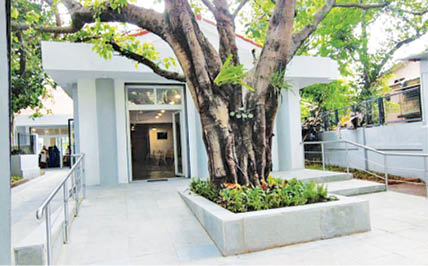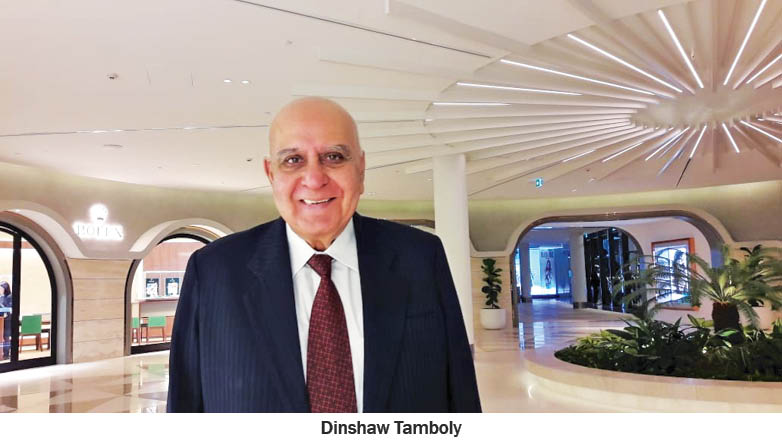Last week, Parsi Times featured how Mumbai’s Mata Ramabai Ambedkar crematorium, located at Worli, is currently being refurbished into a world class public crematorium, with state-of-the-art equipment and facilities. One of Mumbai’s oldest crematoriums, it comprises a special Parsi Prayer Hall for community members those who opt for cremation, but it has been of even greater and more crucial service, especially the pandemic, over the past couple of years. It has proven to be a boon for the relatives of those who have passed away due to Covid, and are not allowed to carry out the traditional last rites or Dokhmenashini, for fear of contagion, in the interest of public safety.
Currently comprising dilapidated buildings, sheds and giant banyan trees, the Worli crematorium which spans nine acres, will be transformed into a world-class public crematorium comprising a series of eight covered pavilions, landscaped gardens, vast skylights, and in-built closed-circuit cameras that relay the funeral ceremony to friends and family, worldwide. It is anticipated to stand out as India’s foremost crematorium, in terms of structure and services, on the conclusion of the renovation, which should take about a year and a half, the first phase of which will be completed within a couple of months, by March 2022. Parsi Times catches up with Dinshaw Tamboly, Chairman, Prayer Hall Services And Maintenance Trust, who shares important insights.
PT: What are the new / enhanced facilities that will now be available to those seeking to cremate their dearly departed at the Worli Crematorium?
Dinshaw Tamboly: The ‘Antim Sanskar Seva’ (Last Rites Services), by the Hiralal Parekh Parivar Charity Trust, has for some years now, been providing truly yeoman humanitarian service by assisting bereaved families in performing funerals with decorum and dignity. They even arrange for the mortal remains to be shifted from hospital to home to crematorium and provide all the materials required for the last rites. In its first decade of operation alone, Antim Sanskar Seva has assisted over 11,000 families!
They believe that mourners, bereaved families and visitors deserve a serene place, where they can gather to pay their last respects to their dearly departed. They have undertaken an ambitious project to refurbish the present facilities, make these environmentally friendly, and provide facilities for mourners, not available earlier. They plan to augment and later replace the two existing electrical furnaces with five new gas-fired furnaces.
The new cremation pavilions will have adjoining prayer and waiting halls, adequate parking, hygienic toilets and conveniently placed drinking water-fountains. The open property is being landscaped into a park. Cremation services will continue to remain free of cost with families having to bear only the expenses incurred on prayers. The entire project has been undertaken by Hiralal Parekh Parivar Charity Trust, at an estimated cost of close to Rs.40,00,00,000 (Rupees Forty Crores), raised through donations by large Charity Trusts and individual donors. This is a remarkable act of philanthropy for a humanitarian cause. The project is expected to be completed in two phases with the first phase expected to be complete by March / April 2022.
Our Prayer Hall will continue to remain functional as usual, the only difference being that once the new gas-fired furnaces become operational, the mortal remains can also be consigned to the new furnaces within the refurbished complex. The overall ambiance of the complex will also be greatly enhanced once the Antim Prashtan Project is complete.
 PT: With the Govt/Judiciary not allowing the traditional Dokhmenashini funeral ritual for deceased Parsis who have succumbed to Covid, how has this Crematorium proven helpful in these times, more than ever before?
PT: With the Govt/Judiciary not allowing the traditional Dokhmenashini funeral ritual for deceased Parsis who have succumbed to Covid, how has this Crematorium proven helpful in these times, more than ever before?
Dinshaw Tamboly: It’s hard to imagine the plight of Parsis, whose dear ones have succumbed to covid, had it not been for the availability of the services of the Prayer Hall Trust, where last rites have been performed with fitting solemnity, helping the soul on its final journey and providing solace to the family and friends of the departed.
PT: Could you share the recent count in terms of deceased Parsis who have used the services of the Prayer Hall?
Dinshaw Tamboly: Since January 2020, when the pandemic began, the mortal remains of a total of 116 persons were consigned to the Worli Crematorium, of which 45 had succumbed to Covid. In 2021, the figures were a total of 153, of which 73 were covid victims. And in 2022, as on 24 January, the figure is 21, of which 12 are pandemic related. From the time the Prayer Hall became operational, in the last week of September 2015, a total of 660 funerals have been performed, which include the funerals of 130 persons who passed on due to Covid.
 PT: You are known to be involved mainly in community welfare activities, having undertaken various community centric projects. What made you also involve the Prayer Hall to your repertoire?
PT: You are known to be involved mainly in community welfare activities, having undertaken various community centric projects. What made you also involve the Prayer Hall to your repertoire?
Dinshaw Tamboly: I have always viewed issues objectively and from a practical perspective. Having always believed in the efficacy of prayers, specially those of the first four days, it was distressing to learn that these essential obsequies were being denied to those who opted for alternate methods of disposal of their mortal remains. I therefore willingly became part of the team of the late Jamsheed Kanga and Homi Khusrokhan, who pioneered the creation of a Prayer Hall at Worli.
PT: Have you encountered challenges in getting priests to perform these ceremonies?
Dinshaw Tamboly: As I said earlier, since the Prayer Hall became operational in the last week of September 2015, 660 funerals have taken place at the Prayer Hall as of 24 January 2022. This would not have been possible if Priests had not been available. The task of getting Priests to perform obsequies at the Prayer Hall are the function of our coordinator, Er. Framroze Mirza, who has been doing a splendid job of administering and managing the facility, under the guidance of the Board of Trustees. Of course, families of the deceased can also appoint their own priests to perform the obsequies if they so wish.
- દિકરી એટલે બીજી માં… - 20 April2024
- નાગપુરની બાઈ હીરાબાઈ એમ. મુલાનદરેમહેરનો ઇતિહાસ - 20 April2024
- વિશ્વ ભારતી સંસ્થાન દ્વારા રતિ વાડિયાનુંસન્માન કરવામાં આવ્યું - 20 April2024
